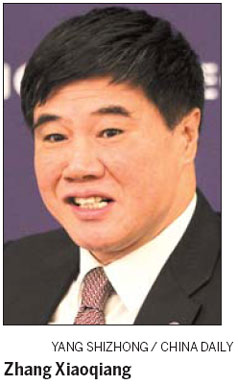Top News
Consumer inflation to stay within govt target
By Lan Lan (China Daily)
Updated: 2010-09-15 09:39
 |
Large Medium Small |
TIANJIN - China's consumer inflation will remain within the government target of 3 percent for this year although it registered a 22-month high in August, said Zhang Xiaoqiang, vice-minister of the National Development and Reform Commission, on Tuesday.
China's consumer price index (CPI), a main gauge of inflation, reached 3.5 percent year-on-year in August, up 0.2 percentage points from July, reaching a 22-month high, according to the National Bureau of Statistics.

The strong growth of CPI has sparked concerns that the country may fail to keep whole-year inflation under 3 percent as it has vowed to do, and lead to a hike in interest rates.
Rising food prices are regarded as a major contributor to the inflation jump as concerns rose after recent weather vagaries, but Zhang said there would be another harvest this year.
"The autumn grain crops are healthy and planting areas were added this year," he said. "It's very likely that we will have a good harvest this year, following increased yields for six consecutive years, on the condition that there are no big weather problems in the upcoming months."
He made the remarks at a press briefing during the Summer Davos Forum, also known as the Annual Meeting of the New Champions 2010.
China has kept grain stockpiles equivalent to more than 40 percent of demand, which helps ensure food supplies and takes the pressure off grain prices, Zhang said.
"Imported grain such as rice and wheat only accounts for less than 1 percent of consumption, so soaring grain prices on the international market only have a very limited impact on China's grain prices," he added.
Zhang said the low basis figure of last August was a major cause of this August's unexpectedly high CPI.
At the same time, to protect farmers' interests, the government has launched minimum purchasing prices for major grains such as rice and wheat. It's natural that market grain prices increase along with the government's purchasing moves, Zhang said.
However, in the next three to four months, the influence of price fluctuations of international commodities on CPI will ease.
"The 3 percent target for the whole year will be reached," Zhang said.
Meanwhile, Zhang said the government is in the process of formulating the 12th Five-Year Plan (2011-2015), in which the authorities will attach great importance to energy saving and emission reduction.
"A binding target will be set in the development strategy for the next five years. The specific figure is under consideration but it will be relatively high," Zhang said.
According to the 11th Five-Year Plan (2006-2010), China's energy consumption per unit of GDP should be reduced by 20 percent at the end of 2010 compared with 2005 levels.




